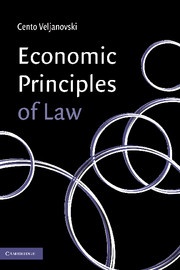5 - Tort
Published online by Cambridge University Press: 03 December 2009
Summary
liability depends upon whether B is less than L multiplied by P
Judge Learned HandTort law determines whether or not the victim of a road accident or medical mishap should be compensated by those who injure him; whether an employer is liable for the injury costs of his workers; or whether a lawyer should be held liable for the losses because of incorrect advice. It is, in short, concerned with accidental losses, and the economics of care, safety and precautions.
The economic approach views tort law as a set of loss (cost) allocation rules that shift (internalise) accident losses selectively with the implied objective of efficiently deterring wrongs. It is an ex post method of creating an accident contract which draws on the fact that the legal process costs are cheaper than market transactions costs.
Economics has had a long and prominent role in the development of tort and its analysis. There is little doubt that in England in the nineteenth century judges adopted the prevailing political economy of Adam Smith in developing significant parts of the common law (e.g. contract and employers' liability). In the twentieth century welfare economics was frequently used as a basis for normative theories of tort, such as enterprise liability and the notion of the superior risk bearer, used to attack tort law. Beginning with workers' compensation legislation there was a drive to abolish tort liability completely in the 1960s, 1970s and 1980s with no-fault compensation schemes.
- Type
- Chapter
- Information
- Economic Principles of Law , pp. 181 - 240Publisher: Cambridge University PressPrint publication year: 2007

